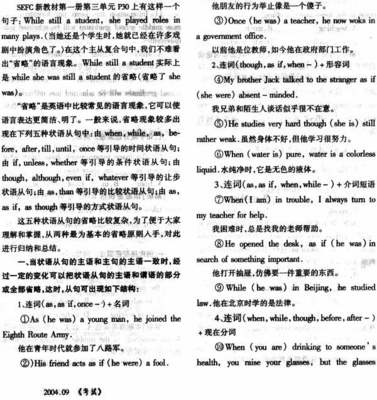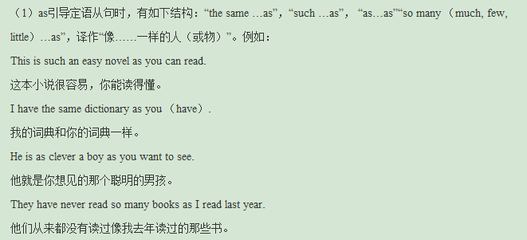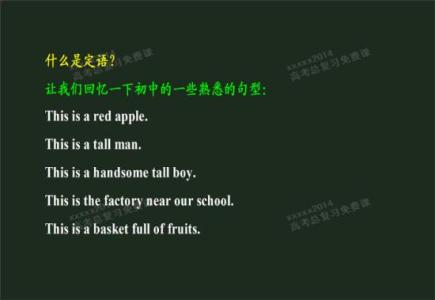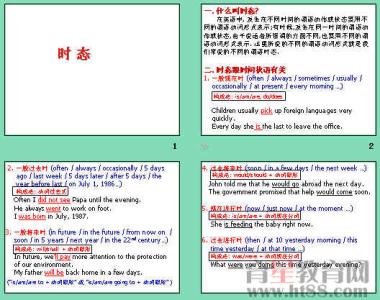由since引导的时间状语从句。
since引导的从句的谓语动词可以是延续性的动词,又可以是瞬时动词。一般情况下,从句谓语动词用一般过去时,而主句的谓语动词用现在完成时。但在It is +时间+since从句的句型中,主句多用一般现在时。例如:
I have been in Beijing since you left. 自从你离开以来,我一直在北京了。
Where have you been since I last saw you? 自上次我和你见面以后,你到哪里去了?
It is four years since my sister lived in Beijing. 我妹妹不在北京住有四年了。
It is five months since our boss was in Beijing.我们老板离开北京有五个月了。
由as soon as, 等引导的时间状语从句。
这些连词都表示“一……就”。例如:
I will go there directly I have finished my breakfast. 吃完早饭,我立即到那里去。
The moment I heard the news, I hastened to the spot.我一听到消息,马上赶到了出事地点。
As soon as I reach Canada, I will ring you up. 我一到加拿大,就给你来电话。
注意:hardly(scarcely, rarely)…when / before, no sooner…than相当于as soon as之意。主句用过去完成时,从句用一般过去时。当hardly, scarcely, rarely和no sooner位于句首时,主句应用倒装语序。例如:
He had no sooner arrived home than he was asked to start on another journey. 他刚到家,就被邀请开始另一旅程。
No sooner had the sun shown itself above the horizon than he got out of bed to commence work.太阳刚从地平线上升起,他就起床劳动去了。
Hardly had I sat down when he stepped in.我刚坐下,他就进来了。
He had hardly fallen asleep when he felt a soft touch on his shoulder.这个阿拉伯人刚要入睡就感到肩膀上被轻轻一触。
由by the time引导的时间状语从句。
注意时态的变化:在一般情况下,如果从句的谓语动词用一般过去时,主句的谓语动词用过去完成时;如果从句的谓语动词用一般现在时,主句的谓语动词用将来完成时。例如:
By the time you came back, I had finished this book.到你回来时,我已经写完这本书了。
By the time you come here tomorrow, I will have finished this work. 你明天来这儿的时候,我将已经完成此工作了。
由each time, every time等引导的时间状语从句。
例如:
Each time he came to Harbin, he would call on me. 他每次来哈尔滨,总是来看我。
Whenever that man says“To tell the truth”, I suspect that he's about to tell a lie.每当那个人说“说实在话”的时候,我猜想他就要说谎了。
You grow younger every time I see you. 每次遇到你,见你更年轻了。
由as long as和so long as引导的条件状语从句。
这两个连词表示“只要“例如:
You can go where you like as long as you get back before dark. 你可以随意到哪里去,只要在天黑以前回来就行。
I will fight against these conditions as long as there is a breath in my body! 只要我一息尚存,我就要反对这种境况。
一、when“当……时”,引导时间状语从句时,从句用于表示主句动作发生的特定时间。如:
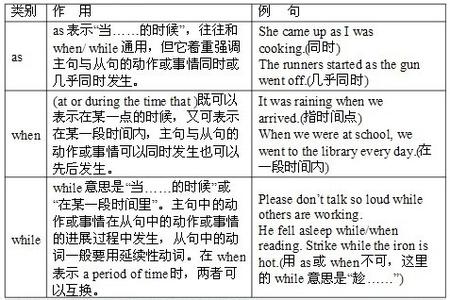
The days get longer when spring comes. = When spring comes, the days get longer.春天到来时,白天变得更长了。
二、before“在……之前”,引导时间状语从句时,表示主句动作发生在从句动作之前。如:
Close the door before you leave the room.离开房间前关上门。
三、after“在……之后”,引导时间状语从句时,表示主句的动作发生在从句的动作之后。如:
I went to school after I finished my breakfast.吃完早饭后我就去上学了。
四、as soon as“一……就……”,引导时间状语从句时,表示主句动作紧接着从句动作发生。如:
I’ll call you as soon as I get home.我一到家就给你打电话。
五、until, till“直到”,引导时间状语从句。当主句谓语动词是延续性动词时,主句常用肯定形式;当主句谓语动词是非延续性动词时,主句要用否定形式,即“not…until/till…”意为“直到……才……”。如:
I’ll wait here until/till the rain stops.我将在这里等着,直到雨停。
You can’t go home until/till you finish your work.直到你完成你的工作,你才能回家。
 爱华网
爱华网